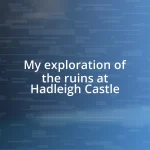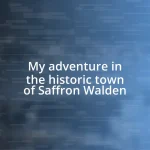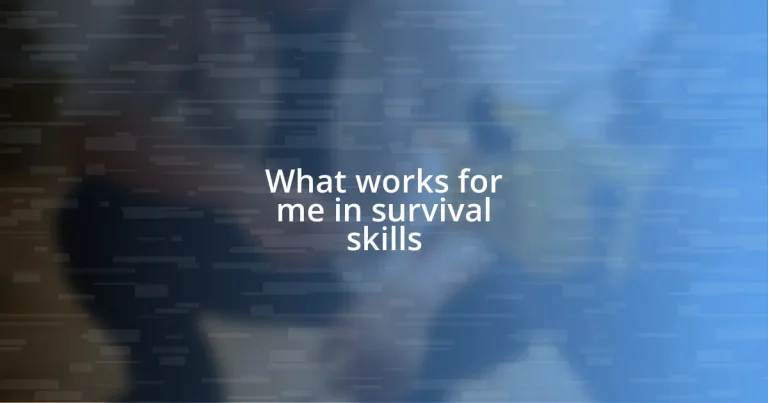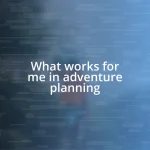Key takeaways:
- The importance of mental resilience and maintaining calmness in survival situations can be crucial for clear decision-making.
- Building various survival skills, such as shelter creation and foraging for food, empowers individuals and enhances confidence in their ability to navigate tough environments.
- Community and teamwork are vital in emergencies, showcasing the strength gained from collaboration and shared resources among individuals.
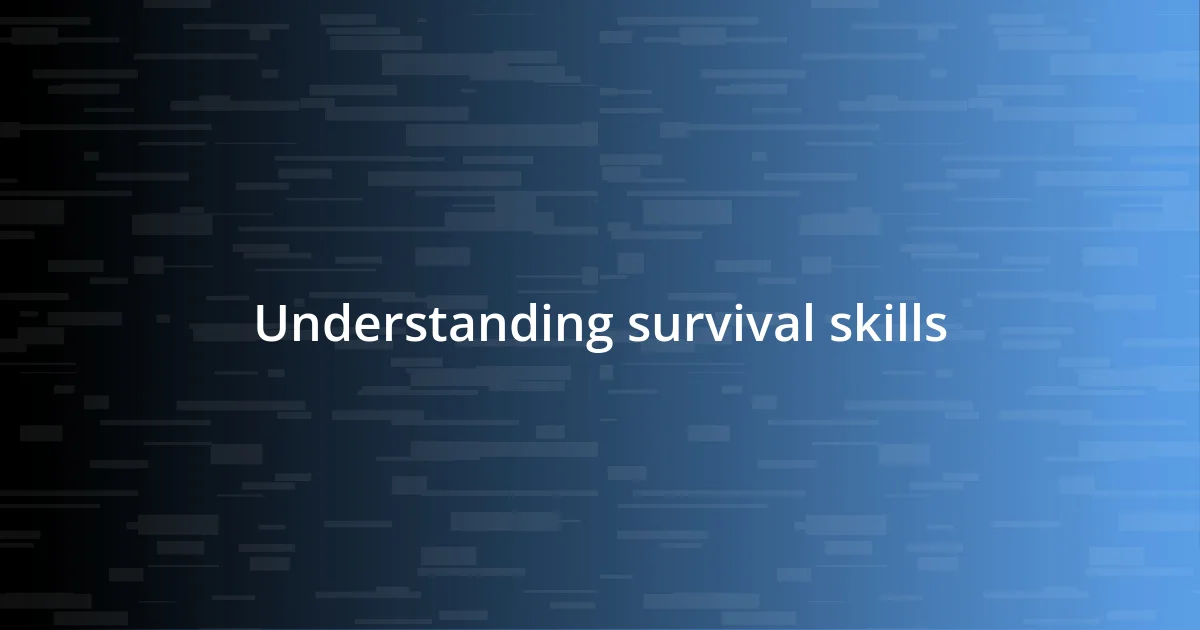
Understanding survival skills
When I think about survival skills, I often reflect on a weekend camping trip where I found myself lost in the woods. It was in that moment, surrounded by towering trees and fading daylight, that I realized the importance of understanding my environment. Knowing how to identify edible plants or which direction to travel based on the sun can be the difference between panic and poise.
Survival skills encompass a wide range of knowledge, from basic first-aid techniques to advanced navigation methods. I remember learning to start a fire with just two sticks—it felt almost magical. Have you ever experienced that rush of empowerment when you realize you can rely on your own abilities to create warmth and light? It’s a profound realization that deepens your confidence.
Diving deeper into survival skills, I’ve learned that mental resilience is just as critical as physical know-how. During that same camping trip, I felt my heart race as the sun set; fear threatened to take hold. But I recalled the techniques I had practiced and focused on what I could control. This made me wonder: how do you handle fear in uncertain situations? That inner strength can be cultivated with practice and knowledge, shaping not just your skills but your perspective on survival.
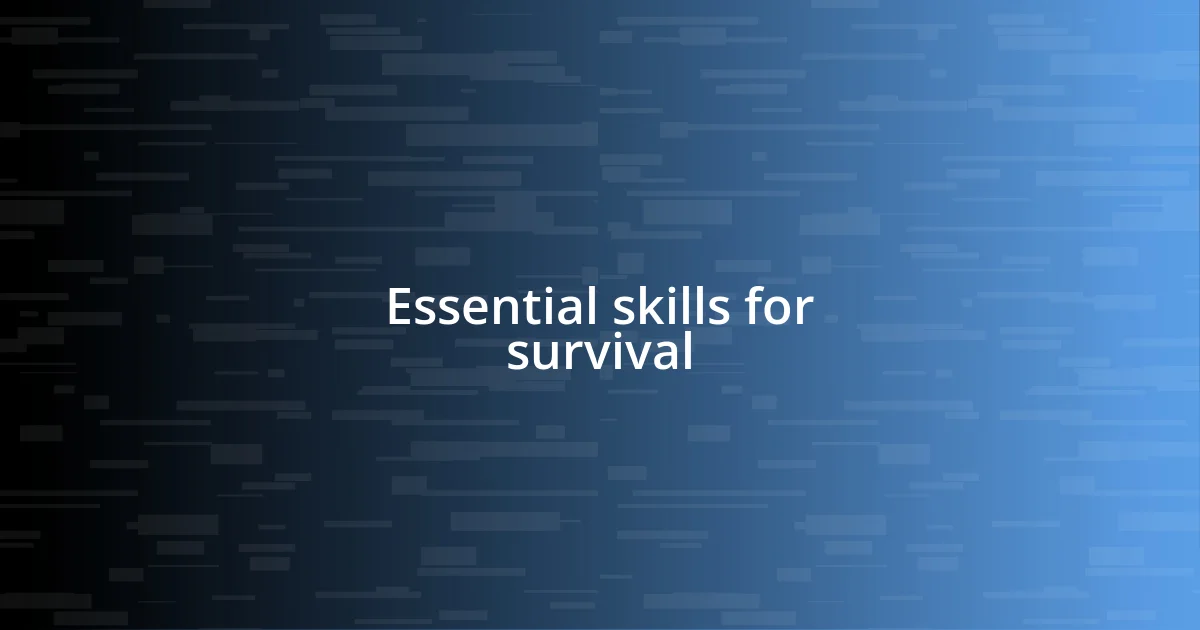
Essential skills for survival
Essential skills for survival
One essential skill I’ve learned in my survival journey is the ability to create a shelter. There was a brisk night when the temperatures dropped unexpectedly during a hike, and I had to improvise a makeshift shelter using fallen branches and leaves. That experience taught me how critical it is to stay warm and protected from the elements, transforming anxiety into resourcefulness in a matter of moments.
- Building a shelter from natural materials
- Finding and purifying water
- Mastering basic first-aid
- Starting a fire without matches
- Navigating using a compass and natural landmarks
Another skill that has served me well is foraging for food. I remember the first time I identified wild berries—all I could think about was whether they were safe to eat. The thrill of knowing I could sustain myself filled me with confidence. Those small victories are incredible; they empower you to trust your instincts and knowledge. It’s truly exhilarating to know that nature provides if you know where to look.
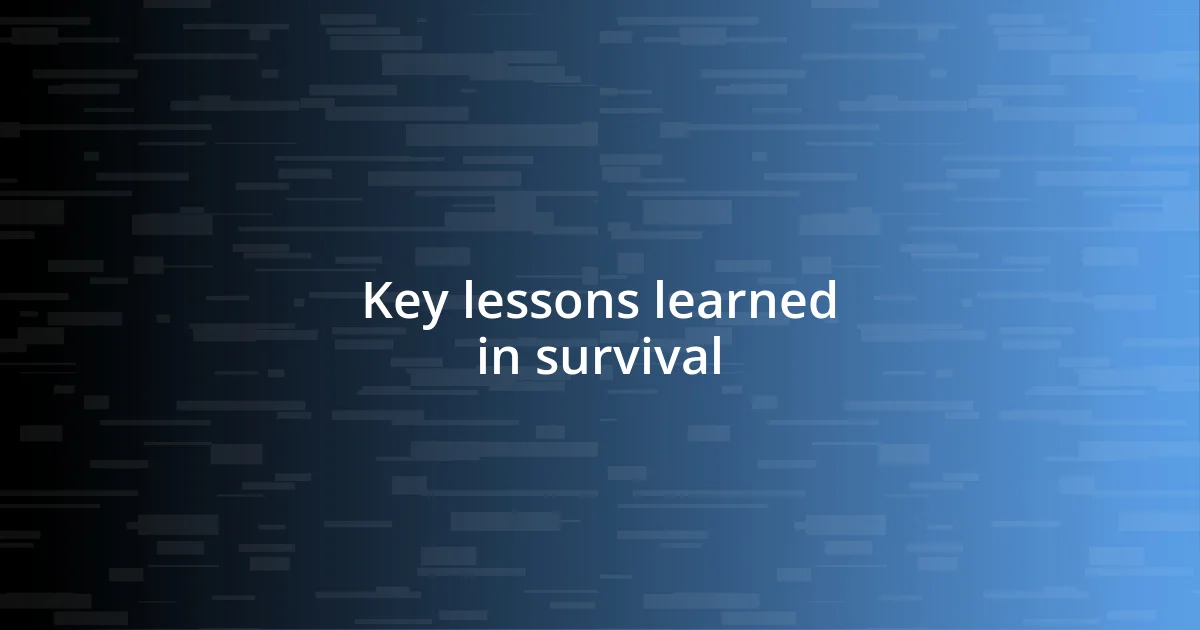
Key lessons learned in survival
Key lessons learned in survival often circle back to a few fundamental truths. During a solo trek through a dense forest, I quickly realized that knowing how to stay calm and think clearly is vital. I once faced a sudden downpour that turned my path into a muddy mess. Instead of panicking, I remembered to breathe, assess my surroundings, and find the safest route. That experience taught me that maintaining a clear mind can truly be one of the most powerful survival tools.
Another remarkable lesson occurred when I found myself without food for longer than anticipated. I vividly remember the moment I spotted a cluster of wild mushrooms. A wave of excitement washed over me, but then doubt crept in—were they safe? I had to trust my instincts and knowledge. This taught me the significance of preparation and understanding what the land can offer. It was a powerful reminder of how crucial it is to educate ourselves about nature, because every bit of knowledge can mean the difference between comfort and hunger.
Lastly, I have come to appreciate the value of community in survival situations. While on a group camping trip, we encountered a sudden storm, and the way everyone sprang into action to help each other was inspiring. We shared resources and skills, transforming a potentially frightening experience into a collective challenge. This reaffirmed my belief that survival is not just about the individual but also about connection and working together, showcasing the strength we gain from unity.
| Key Lesson | Personal Experience |
|---|---|
| Calmness | Staying calm in a storm taught me the importance of clear thinking. |
| Knowledge | Identifying safe food helped build my confidence in foraging. |
| Community | Working together during a storm highlighted the power of connection. |
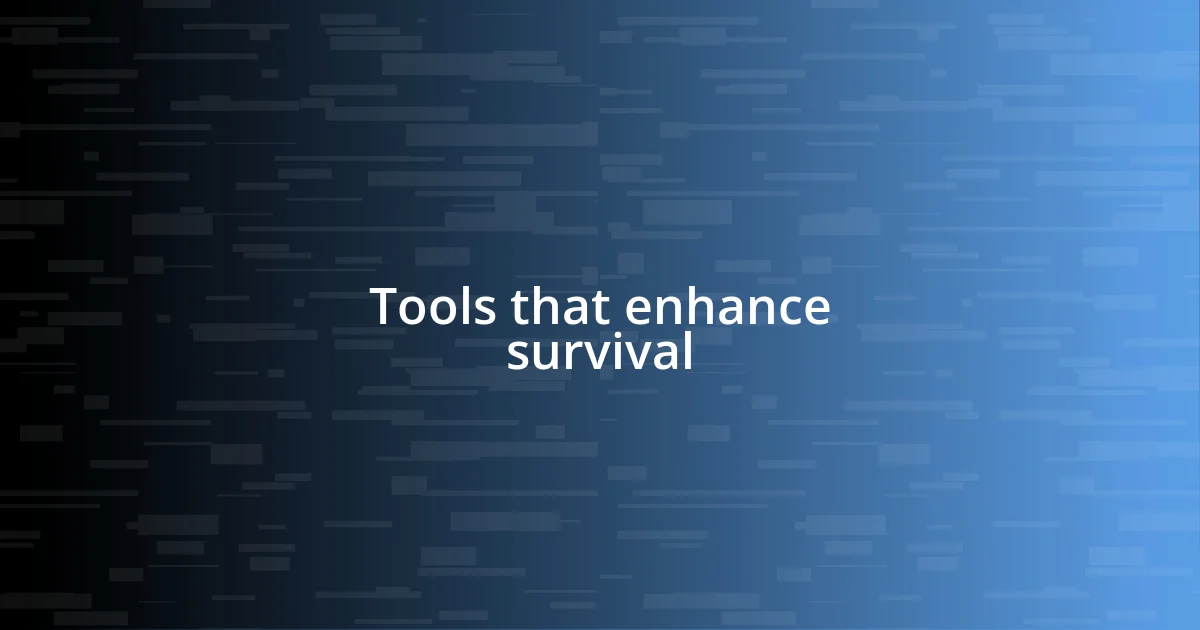
Tools that enhance survival
Tools are vital in enhancing survival, and each one can dramatically change your experience in the wild. For instance, a sturdy multi-tool has been my go-to companion. I remember a time when I had to cut away a tangle of vines blocking my path. With just one tool in hand, I managed to clear my way, saving not just time but also a great deal of frustration. Have you ever faced a similar situation where the right tool turned an obstacle into an opportunity?
Fire starters are another indispensable tool in my survival kit. During one particularly chilly evening in the woods, I recall struggling to stay warm. My matchsticks were damp, and panic began to creep in. But then I reached for my trusty ferro rod. With just a few sparks, I had a blazing fire going, and that warmth was an instant comfort—the kind that makes you feel grateful for the small things. Isn’t it fascinating how something as simple as a spark can change your mood and keep you safe?
Lastly, I can’t overstate the importance of a reliable water filter. On one hike, I stumbled upon a murky creek and was faced with a nagging concern: could I drink from it? Thankfully, my portable filter came to the rescue. I could purify that water and keep hydrated without a second thought. It’s a game-changer to know you can access clean water no matter where you are. Isn’t that peace of mind worth its weight in gold? Each tool I rely on has taught me lessons in resourcefulness and confidence—a reminder that preparation is truly empowering.
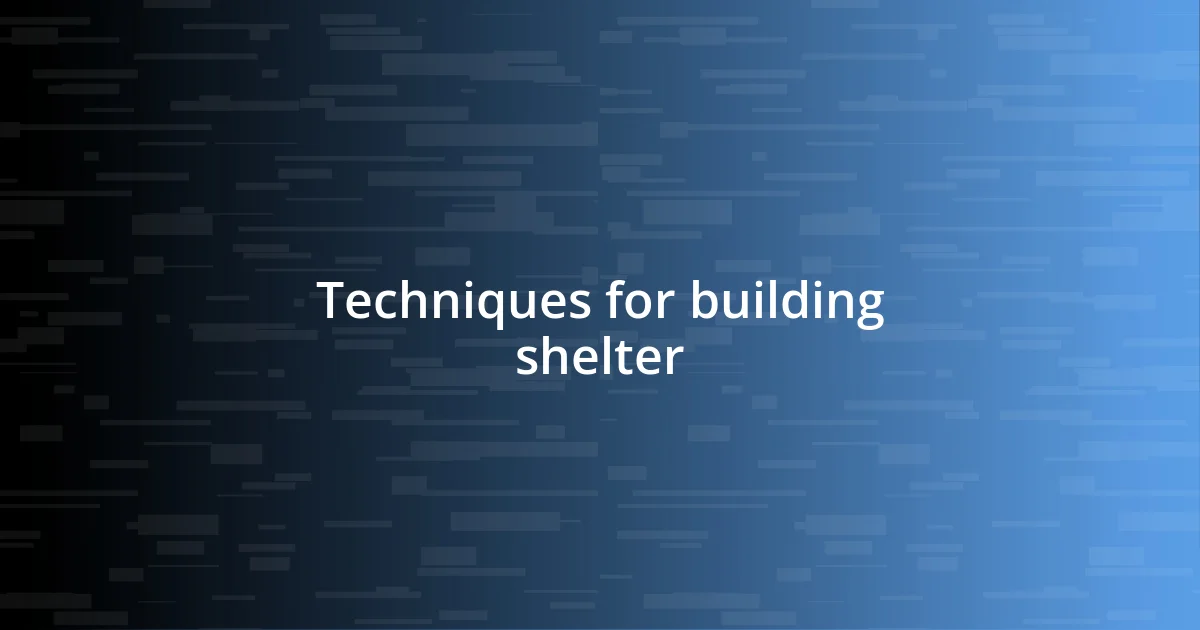
Techniques for building shelter
When it comes to building shelter, my go-to technique is the lean-to method. I recall one cold night when I found myself with only a few fallen branches. By leaning larger branches against a sturdy tree, I created a makeshift wall that blocked the wind. It was quick, effective, and provided me with a sense of safety. Isn’t it amazing how nature’s materials can come together to form a protective space?
I’ve also experimented with using leaves and moss as insulation. One particularly rainy evening, I gathered piles of thick leaves and stuffed them into my shelter. Not only did this help keep the dampness at bay, but it also gave me a cozy feeling of being wrapped in a blanket. It’s funny how those simple, natural elements can evoke such comfort, right? It’s a good reminder that sometimes, the best solutions are the ones that blend seamlessly with our surroundings.
A key takeaway for me was the importance of site selection. I’ve learned to avoid low-lying areas where water tends to collect, like the time I set up camp by a creek, only to wake up surrounded by puddles. Choosing a dry, elevated spot can make a world of difference in how comfortable you feel through the night. Have you ever faced a situation where your shelter location impacted your safety? For me, those experiences have been invaluable lessons in prioritizing proper planning.
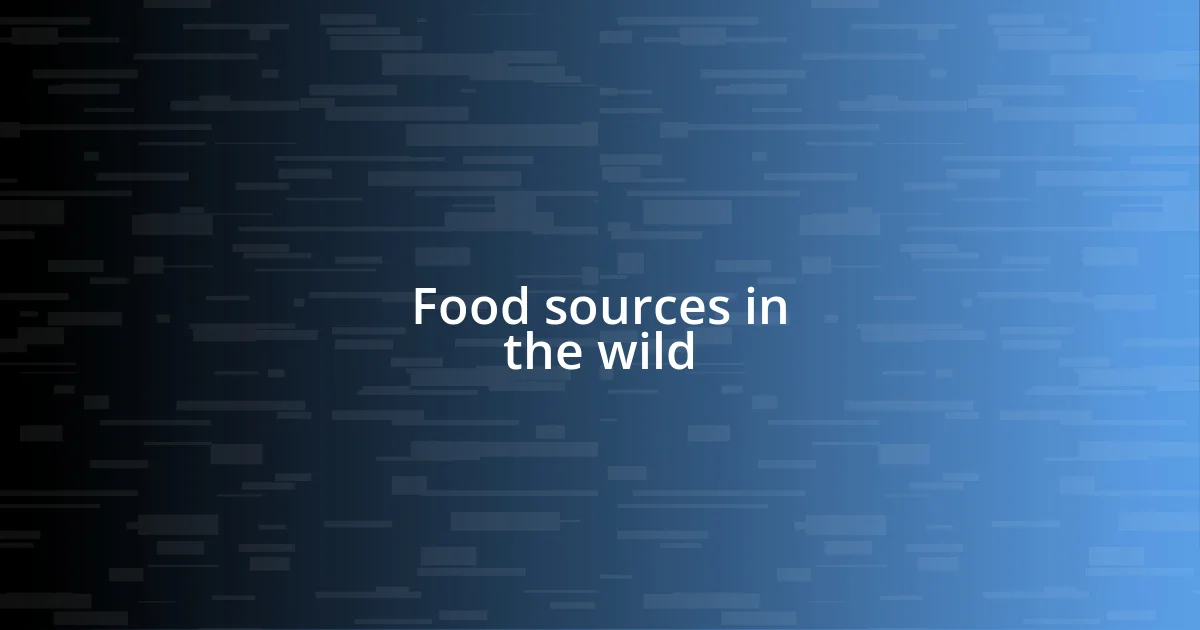
Food sources in the wild
Food sources in the wild can be surprisingly diverse, but knowing which ones are safe is essential. I vividly remember my first foray into wild foraging when I stumbled upon a patch of wild berries. The rush of excitement was palpable as I picked and tasted them, careful to identify the tell-tale signs of edibility. It’s a thrill to connect with nature this way, don’t you think? But it’s crucial to have a reliable guide or resource on hand because not all wild berries are friendly.
One of my most reliable food sources has been wild edible plants, such as dandelion greens. During a particularly challenging hike when my food supplies dwindled, I was relieved to spot these vibrant greens peeking through the earth. Gathering just a handful provided not only sustenance but also a sense of accomplishment. It’s empowering to rely on natural resources, isn’t it? I learned that recognizing the vital signs of edible plants can turn a potentially grim situation into a picnic in the wild.
Fishing is another skill that has come in handy during my outdoor adventures. I’ll never forget the sense of anticipation I felt while setting up a simple fishing line at a tranquil lake. That moment of waiting, feeling the gentle tug on the line, and finally reeling in a catch became a reminder of patience and reward. Have you ever felt that connection to your food source? It’s an enriching experience that deepens your appreciation for what nature offers. Plus, knowing I can provide for myself, even in a pinch, brings me a profound sense of confidence and security.
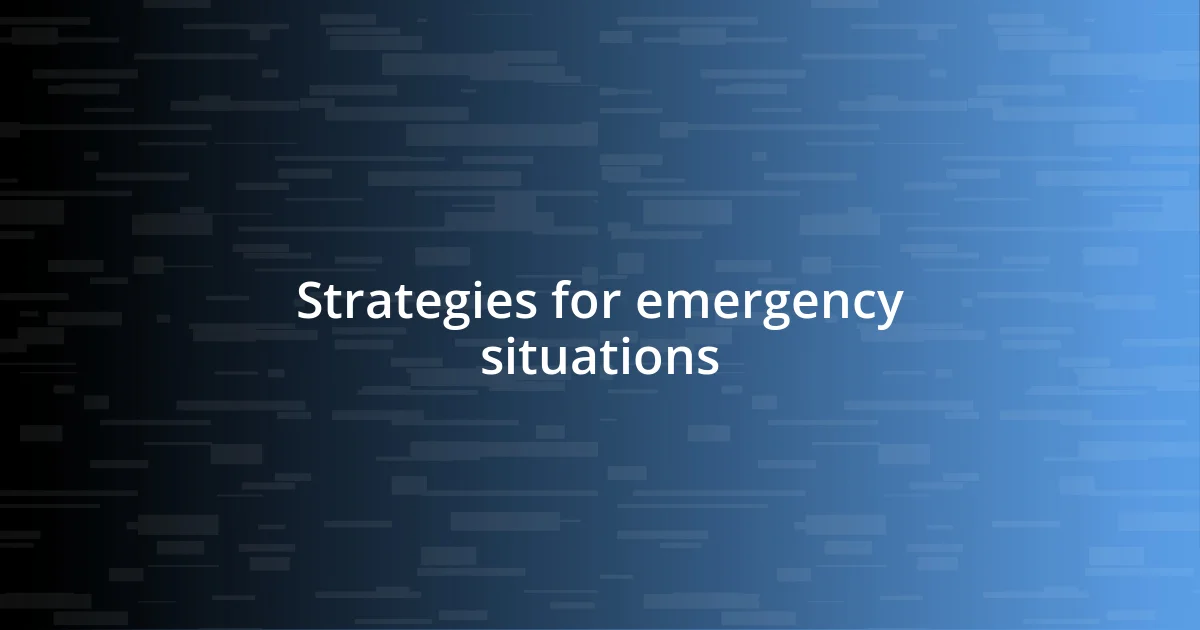
Strategies for emergency situations
In an emergency situation, having a solid communication strategy can be a lifesaver. I remember a mountain hike gone wrong when my friend and I got separated. Initially, panic set in, but we had agreed on a rally point beforehand and a system of whistles to signal each other. This small preparation made all the difference, allowing us to locate each other safely when visibility dropped. Isn’t it comforting to know that a bit of planning can turn chaos into calm?
Equally vital is situational awareness. I recall a camping trip where I became hyper-aware of my surroundings after spotting signs of wildlife nearby. It’s surprising how much you grow to notice when your survival instincts kick in. That day, I learned to observe animal tracks and listen for sounds, which helped me gauge potential dangers and sources of help. Have you ever taken a moment to just tune into your environment? Trust me, it can provide essential insights in a pinch.
Lastly, the importance of resourcefulness can’t be overstated. There was a moment during one of my solo hikes when I faced a sudden downpour, and my gear got soaked. Instead of despairing, I quickly gathered stones and constructed a makeshift drainage trench to divert the water from my tarp. It’s a vivid reminder that sometimes, thinking outside the box is what keeps us going. How often do we overlook our ability to adapt? Creativity in problem-solving is often the key, showing us that survival skills frequently rely more on mindset than mere knowledge.
